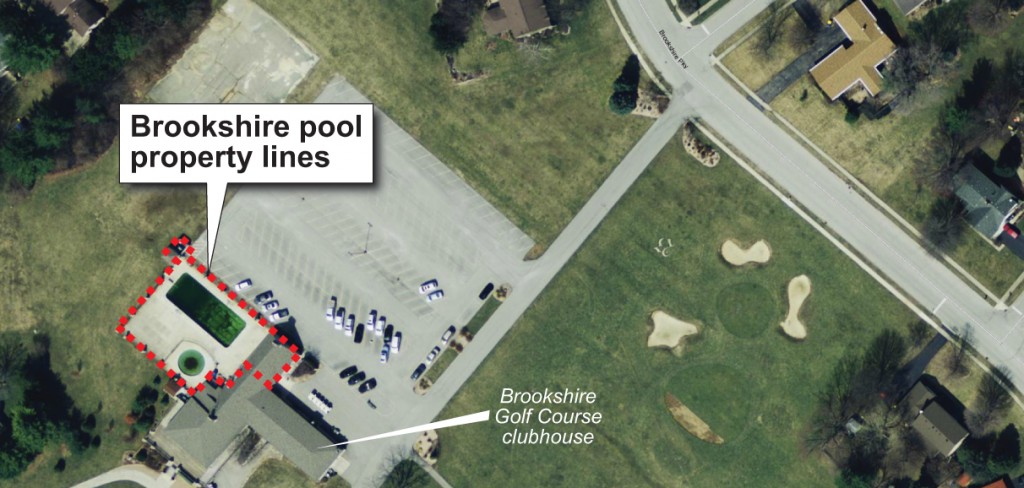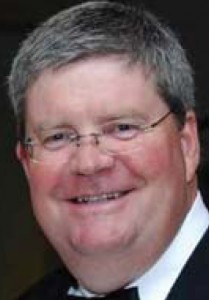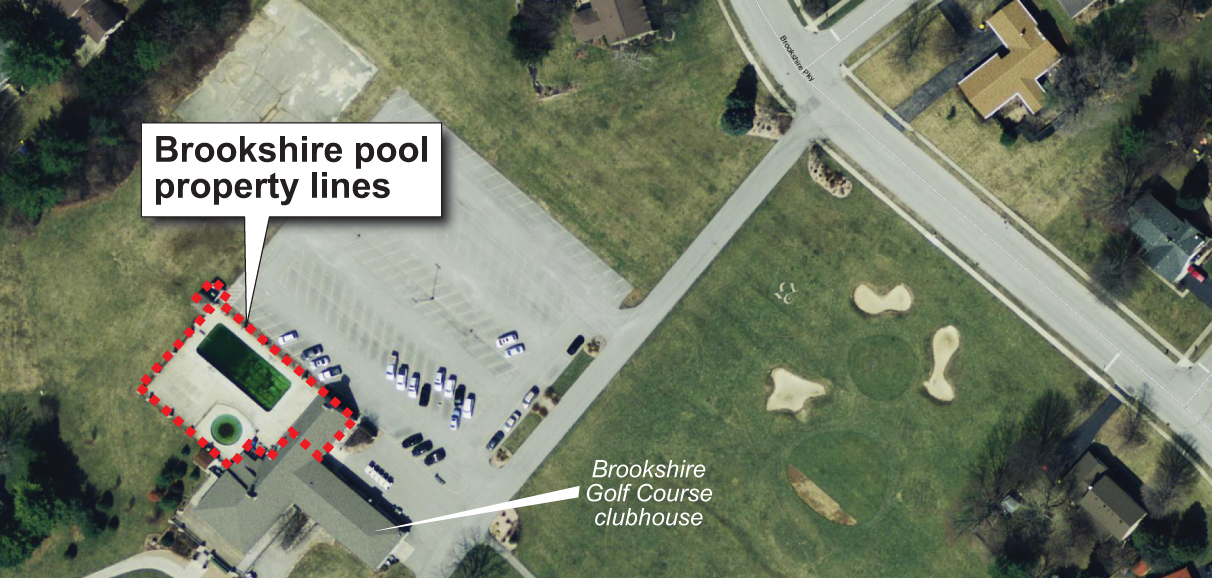
By Pete Smith
The Carmel City Council is currently deciding whether or not to purchase the pool at Brookshire Golf Course for $70,000. And councilors are currently weighing the question of why public money should be used for a neighborhood pool.
The move would bail out the pool’s current owner, Leo Dierckman, a member of Carmel’s Board of Zoning Appeals, who has said he no longer wants to operate the enterprise.

It’s also a consideration that the Carmel Clay Parks and Recreation board rejected earlier this year after conducting a feasibility study.
But the city’s motivation is different considering it owns the property which completely surrounds the pool and the history behind the pool’s current ownership.
Brookshire Swim Club, the nonprofit which currently owns and manages the pool in name, was founded in 1999 by a group of neighbors who were concerned that the ownership of Brookshire Golf Course would close the pool.
At the time, the nonprofit simply managed the pool using volunteer labor and revenue from membership dues, said past board member Debbie Eckstein.
The owners of the golf course began missing mortgage payments, and in 2004 a company called Brookshire First Mortgage foreclosed on both the course and the pool. The lending company had little interest in managing a pool, but it did offer Brookshire Swim Club an alternative.
Brookshire First Mortgage would provide the nonprofit with a $95,000 dollar loan that would require a $5,000 annual payment to cover interest on the loan, and in exchange the company would transfer the deed to the pool to Brookshire Swim Club for $1.
The interest-only loan would allow Brookshire Swim Club to continue management of the pool but allow the mortgage company the right to call the note at anytime, said Dierckman, a long-time member of the Carmel Plan Commission and St.Vincent Foundation Board of Directors.
Buying the pool outright
Dierckman said the deal was arranged because the owners said they could neither make money operating the pool nor obtain liability insurance.
But when the mortgage company pitched the idea of allowing new development on the golf course in 2006, the Carmel Redevelopment Commission eventually decided to purchase the golf course to maintain its current use.
“My thought at the time was the city will buy the course and the pool, and we’ll lease it from the city,” Dierckman said.
But Brookshire First Mortgage wanted $3 million for the entire property and the city was only willing to pay $2.6 million. So Dierckman said a compromise was struck that would require the city to allow the mortgage company land and rights to build a cell tower on the golf course and require Brookshire Swim Club to buy the pool for $100,000.
So in June of 2006 the nonprofit took out a loan from 5/3 Bank for $90,000 and made up the purchase price difference in $10,000 from pool revenues.
“The homeowners association didn’t contribute a dime,” Dierckman said.
Changing fortunes
But as with all things in this world, time was conspiring against the pool.
Many of the children of parents who first founded Brookshire Swim Club or volunteered at the pool had grown up or moved away. That has translated into a steady decline in membership dues.
And according to tax records filed with the IRS, by 2009 the pool’s revenue was 14 percent less than expenses.
Dierckman said that accounting figure occurred even with most of the pool’s maintenance being performed by him and his son.
“We can’t afford a plumber,” he said. “Of course we do it ourselves.”
And the pool wasn’t getting any younger.
When the parks department considered the purchase of the pool this year, it noted it would need $36,000 in immediate capital improvements.
But the real dagger may have been something outside the neighborhood’s control – the successful opening of the Monon Center in Central Park in 2007, Dierckman said.
But parks department director Mark Westermeier isn’t sure that’s the case.
“It’s had some impact, but it’s been pretty minimal,” he said, noting that young families still tend to use neighborhood pools.
Westermeier also noted that the Brookshire pool’s complicated history may hinder its success because the homeowners association doesn’t own it and its upkeep needs aren’t factored into the HOA dues.
Another change in ownership
Brookshire Swim Club was forced to make a choice in 2010 when 5/3 Bank refused to renew its loan. The loan’s principal had been paid down to about $70,000, but the pool did not have enough revenue or reserves to pay off the entire note, Dierckman said.
“I wanted to see the pool remain open for the kids,” he said.
So Dierckman personally lent Brookshire Swim Club $80,500 to payoff the 5/3 Bank loan and retain control of the pool according to public records detailing the mortgage. It’s an interest-only loan that allows Dierckman to pull the pool’s note if necessary.
Dierckman said he only provided the nonprofit a $70,000 line of credit.
But the pool needs more members to stay viable, he said, noting that only 15 percent of the households in the Brookshire neighborhood are members of the pool.
Of the pool’s 149 members in 2013, almost 60 percent of them live outside the neighborhood, Dierckman said.
“I wanted to sell the pool to Parks to stop the bleeding, stop the liability exposure to me and my family, reduce my responsibilities and move on with my life,” Dierckman said in an email earlier this year to a group of prospective buyers. “Fourteen years is enough!”
The group of people from the neighborhood – not the homeowners association – offered Brookshire Swim Club $30,000 for the pool. But the nonprofit’s 5-person board, now solely composed of Dierckman, his wife Jennifer and lawyer Kim TeKolste, rejected the offer because it wouldn’t reimburse Dierckman for the loan that he made.
Which leaves the City of Carmel as the last viable option to reunite the pool and golf course that are so inextricably linked.
The pool’s future
“I hope that the city will buy the pool and then sell it to a community group with an interest-only loan with the right to buy it back,” Dierckman said.
He said he wants the pool to be there forever, but now that he has moved out of the Brookshire neighborhood, he is just ready to move on.
And with good reason.
The pool was the target of serious vandalism on August 13 that resulted in about $1,000 damage. The vandalism written on pool facilities in black marker used obscenities to target Dierckman specifically in 10 separate locations.
But the city’s main complication in purchasing the pool might be meeting the standards of the Americans with Disabilities Act said city councilor Luci Snyder.
Those standards might require the pool to install a lift to get disabled people in and out of the pool, a new fence around the pool and improvements to the eating area to comply with current health codes, Westermeier said.
But even if the city does decide to purchase to pool and resolve the fracture that occurred when it bought the golf course in 2006, it might not fix the most contentious issue surrounding the pool.
When the parks department conducted its feasibility study, it determined that the Brookshire swim team could no longer use the pool for free, Dierckman said.
The swim team, composed of young swimmers 6 to 14 years old, had been using the pool at no cost until last year. But due to liability concerns it is now required to purchase a key and maintain a lifeguard for practices, Dierckman said.
And that is unlikely to change no matter who owns the pool.
The city’s decision
Councilor Snyder represents the Brookshire neighborhood on the city council, but she said she is awaiting a decision by the parks department board on whether it will purchase the golf course. That decision isn’t likely until after a public hearing on the matter scheduled for Jan. 22.
Snyder has consistently said she would like the city to sell Brookshire Golf Course and use the proceeds to pay down the debt it incurred in its purchase. But given the diminishing prospects of a sale of the golf course, she said the city council likely would vote to approve the purchase of the pool.
City Councilor Rick Sharp, a sponsor of the ordinance to purchase the pool, said he would be in favor of purchasing the pool because it would allow for the possibility of an expanded clubhouse.
Depending on the contingency of an expanded clubhouse to increase golf course revenues and lure golf tournaments, the pool then would face two outcomes: either be filled in and built over or be leased to a third party to operate it so that the disability act requirements can be avoided.
“I understand Leo’s need. He needs to get out from under it,” Snyder said. “I feel badly for him, but … it’s not my job to clean up the mayor’s messes.”
Snyder said that upon reviewing the number of people in the Brookshire neighborhood who use the pool, she thinks the pool stirs feelings of nostalgia, but that it is likely a feature whose time has passed.
She said, “It’s a dying thing.”
[gview file=”https://youarecurrent.com/wp-content/uploads/2013/12/Brookshire-Pool-Feasibility-Study-3-26-13.pdf” profile=”2″]


